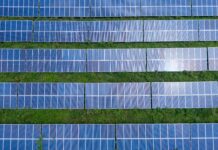Bottom line: Yingli’s new bank loan will be followed by a major restructuring that will force big losses on bond and shareholders, while a new asset-backed bond program to help the broader panel sector raise money will meet with tepid reception.
China is throwing a couple of lifelines to its struggling solar panel sector, including a relatively large rescue package for Yingli (NYSE: YGE), the player in the most precarious position. That package will see a consortium of banks, led by the policy-driven China Development Bank, provide Yingli with 2 billion yuan ($300 million) in funds as the company tries to reorganize its financially strapped balance sheet.
Word of the rescue package comes as media are reporting separately that China is preparing a much bigger lifeline for the sector, by allowing solar panel makers to sell bonds backed by the growing number of solar farms they are self-developing. Such farms provide a steady source of income from the power they generate, and thus should theoretically be more attractive to investors than directly investing in the financially-challenged solar panel makers themselves.
These 2 latest moves come as China’s solar panel makers are still trying to climb out of a 4-year-old downturn caused by a production glut that has stubbornly persisted to the present. A big reason the glut has yet to abate is due to companies like Yingli, which make lower-end product and compete almost purely by offering extremely low prices. Such companies should theoretically go bankrupt in a truly commercial climate. But in this case they are being artificially supported by government entities, who worry about the chaos that such closures might create.
After teetering on the brink of insolvency for much of the last year, YIngli’s situation remains very tenuous, including a massive $500 million net loss in its latest reporting quarter. The company is badly in need of a restructuring to relieve some of its large debt burden, which totaled 10 billion yuan ($1.5 billion) at the end of last September.
It technically defaulted on a bond last year, but later found funds at the last minute to pay most of the money, even as the patience of its bondholders wore thin. (previous post) Now media are reporting the company has just landed the new 2 billion yuan bank loan as part of a temporary measure to help it stay in business ahead of a needed restructuring. (Chinese article)
State-Backed Syndicate
China Development Bank is leading the borrower consortium, which is almost certainly composed exclusively of big state-owned banks that have been ordered by the government to provide the funds. Word of this funding comes just days after earlier media reports that Cinda Asset Management (HKEx: 1359), one of China’s largest asset-managers that specialize in bad debt, was looking to join a group of financial firms that would help Yingli to restructure. (English article)
I suspect these 2 developments are related, and we’ll probably see Yingli announce a major restructuring sometime in the next 2-3 months. It’s clear that bondholders will probably be asked to forgive a big portion of their debt as part of the restructuring, though it’s less clear what will happen to the company’s stock. Stock buyers appear to think they will escape without any damage, based on a recent rally in Yingli shares. But I suspect they could see their equity significantly diluted if Yingli decides to make a major new share issue as part of any settlement with its bond holders.
Next there’s the bigger industry news, which says China is preparing to allow solar panel makers to issue bonds that are backed by income from the solar farms that many are building. (English article) A company called Shenzhen Energy Group broke ground in the area when it was allowed to raise 1 billion yuan last month by selling the first such bonds.
Industry leader Canadian Solar (Nasdaq: CSIQ) has already been moving in a similar direction, announcing plans late last year to spin off its solar plant-building unit for a separate IPO to raise new funds. (previous post) This new plan could help many of the sector’s other players like Trina (NYSE: TSL) and ReneSola (NYSE: SOL) raise much-needed funds through bond issues. But that said, I expect that many of the bonds could get a tepid reception from investors due to man uncertainties about the future of solar power in China and in other countries.
Doug Young has lived and worked in China for 20 years, much of that as a journalist, writing about publicly listed Chinese companies. He currently lives in Shanghai where, in addition to his role as editor of Young’s China Business Blog, he teaches financial journalism at Fudan University, one of China’s top journalism programs. He writes daily on his blog, Young´s China Business Blog, commenting on the latest developments at Chinese companies listed in the US, China and Hong Kong. He is also author of a new book about the media in China, The Party Line: How The Media Dictates Public Opinion in Modern China.






